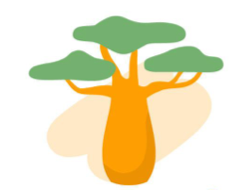Anthroponymie des initiés à travers les chansons initiatiques : exemple de la chanson d’ouverture du keoogo
- 27 mars 2023
- Publié par : admin
- Catégorie : Baobab N°24
Auteur(s) : Moumouni ZOUNGRANA
Université Ouaga I Pr Joseph KI-ZERBO
Unité de Formation et de Recherche en Lettres, Arts et communication (UFR/LAC)
Département de Lettres Modernes
zmoumouni44@yahoo.fr
Télécharger l'article
Mots-clés : Anthroponymie, camp initiatique chanson initiatique, initié, rituel.
Résumé : Le keoogo est un camp initiatique réservé aux hommes en milieu moaaga. Il s’agit d’un rituel de passage qui consacre l’intégration des jeunes garçons dans le cercle des adultes. La période de réclusion, moment essentiel du camp, constitue un temps d’apprentissage
d’information et de formation qui prépare les néophytes à leurs futures responsabilités d’homme. Les Moose étant un peuple à tradition orale, les supports pédagogiques utilisés pour cette mission éducative se fondent sur les textes oraux parmi lesquels la chanson. En se limitant à la chanson d’ouverture, l’objectif de ce travail est de mettre en lumière le rapport qui existe entre les anthroponymes évoqués dans le texte et la finalité du camp. Une démarche méthodologique basée sur l’entretien de terrain complétée d’une étude documentaire et analytique a permis de regrouper les anthroponymes évoqués en trois rubriques correspondant chacune à un des objectifs du camp notamment la préparation au mariage et à la fécondité, la soumission aux coutumes et la cohésion sociale par l’amour fraternel.
Abstract : The keoogo is an initiation camp reserved for men. In Moaaga, it is a ritual of passage that consecrates the integration of young boys into the adult circle. The period of seclusion, the essential moment of the camp, is a time of information and training that prepares neophytes for their future responsibilities as men. The Moose being a people with
oral tradition, the educational materials used for this educational mission are based on the oral texts among which the song. By limiting itself to the opening song, the objective of this work is to highlight the relationship that exists between the anthroponyms mentioned in the text and the purpose of the camp. A methodological approach based on field interviews supplemented by a documentary and analytical study allowed to group the anthroponyms mentioned in three sections each corresponding to one of the objectives of the camp including preparation for marriage and fertility, submission to customs and social cohesion through brotherly love.
